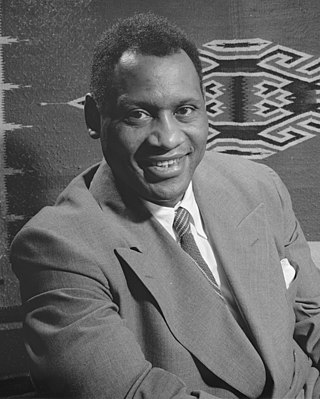
Paul Leroy Robeson was an American bass-baritone concert artist, stage and film actor, professional football player, and activist who became famous both for his cultural accomplishments and for his political stances.
Spiritual is the adjective for spirit.
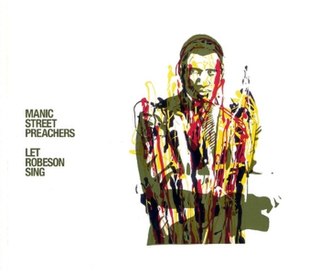
"Let Robeson Sing" is a song by Welsh alternative rock band Manic Street Preachers. It was released in September 2001 by record label Epic as the fourth and final single from their sixth studio album, Know Your Enemy. It reached number 19 in the UK Singles Chart.
"Ol' Man River" is a show tune from the 1927 musical Show Boat with music by Jerome Kern and lyrics by Oscar Hammerstein II. The song contrasts the struggles and hardships of African Americans with the endless, uncaring flow of the Mississippi River. It is sung from the point of view of a black stevedore on a showboat, and is the most famous song from the show. The song is meant to be performed in a slow tempo; it is sung complete once in the musical's lengthy first scene by the stevedore "Joe" who travels with the boat, and, in the stage version, is heard four more times in brief reprises. Joe serves as a sort of musical one-man Greek chorus, and the song, when reprised, comments on the action, as if saying, "This has happened, but the river keeps rolling on anyway."
The American Crusade Against Lynching (ACAL) was an organization created in 1946 and headed by Paul Robeson, dedicated to eliminating lynching in the United States. A strong advocate of the Civil Rights Movement, Robeson believed "a fraternity must be established in which success and achievement are recognized and those deserving receive the respect, honor and dignity due them." In his speech "The New Idealism", delivered as a Rutgers College valedictory address, Robeson supported the idea that all – both colored and white people – need to take part in the creation of the new "American Idealism"; which led to the development of the American Crusade Against Lynching.

"Ballad for Americans" (1939), originally titled "The Ballad for Uncle Sam", is an American patriotic cantata with lyrics by John La Touche and music by Earl Robinson. It was written for the Federal Theatre Project production, Sing for Your Supper that opened on April 24, 1939. Congress abolished the project on June 30, 1939. The "Ballad of Uncle Sam" had been performed 60 times.
"The Wayfaring Stranger", Roud 3339, is a well-known American folk and gospel song likely originating in the early 19th century about a plaintive soul on the journey through life. As with most folk songs, many variations of the lyrics exist and many versions of this song have been published over time by popular singers, often being linked to times of hardship and notable experiences in the singers' lives, such as the case with Burl Ives' autobiography.

"Sometimes I Feel Like a Motherless Child", also "Motherless Child", is a traditional Spiritual. It dates back to the era of slavery in the United States.

"Deep River" is an anonymous African-American spiritual, popularized by Henry Burleigh in his 1916 collection Jubilee Songs of the USA.
A spoken word album is a recording of spoken material, a predecessor of the contemporary audiobook genre. Rather than featuring music or songs, the content of spoken word albums include political speeches, dramatic readings of historical documents, dialogue from a film soundtrack, dramatized versions of literary classics, stories for children, comedic material, and instructional recordings. The Grammy for Best Spoken Word Album has been awarded annually since 1959.

"Nobody Knows the Trouble I've Seen" is an African-American spiritual song that originated during the period of slavery but was not published until 1867. The song is well known and many cover versions of it have been done by artists such as Marian Anderson, Lena Horne, Louis Armstrong, Harry James, Paul Robeson, and Sam Cooke among others. Anderson had her first successful recording with a version of this song on the Victor label in 1925. Horne recorded a version of the song in 1946. The Deep River Boys recorded their version in Oslo on August 29, 1958. It was released on the extended play Negro Spirituals Vol. 1, and the song was arranged by Harry Douglas.
Big Fella is a 1937 British musical drama film directed by J. Elder Wills and starring Paul Robeson, Elisabeth Welch and Roy Emerton. It is loosely based on the novel Banjo by Harlem Renaissance writer Claude McKay.

Kenneth Spencer, was an American operatic singer and actor. Spencer starred in a few Broadway musicals and musical films in the United States during the 1940s. Frustrated with the racial prejudice he experienced in the United States as a black man, Spencer moved to West Germany in 1950 where he had a successful singing career. He also appeared in a number of German films. His career was cut short when he died in the crash of Eastern Air Lines Flight 304.
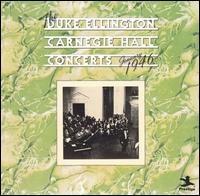
The Carnegie Hall Concerts: January 1946 is a live album by American pianist, composer and bandleader Duke Ellington recorded at Carnegie Hall, in New York City in 1946 and released on the Prestige label in 1977.
Lawrence Benjamin Brown was an American singer, composer and pianist born in Jacksonville, Florida. He is best known for his arrangements of Negro spirituals, many of which he performed as accompanist for Paul Robeson, performing on piano and singing harmony.
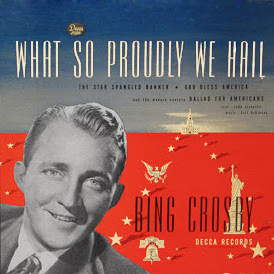
What So Proudly We Hail is a compilation album of phonograph records by Bing Crosby released in 1946 featuring songs that were sung by Crosby in an American-type patriotic style. This album featured Bing singing patriotic songs such as: "Ballad for Americans", "God Bless America" and "The Star-Spangled Banner". The songs were later presented in a 33 1/3 rpm split set with The Man Without a Country.
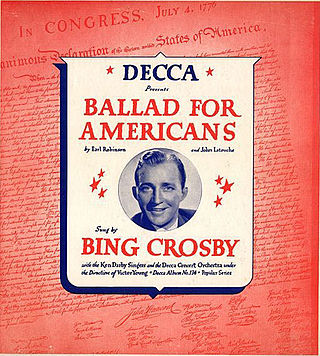
Ballad for Americans is a studio album of phonograph records by Bing Crosby released in 1940 featuring the popular "Ballad for Americans" sung by Crosby in an American-type patriotic style. In 1946, the two records in this album were put into a new album called What We So Proudly Hail. This was Crosby's first studio album that was not a reissue of earlier singles.

Freedom was a monthly newspaper focused on African-American issues published from 1950 to 1955. The publication was associated primarily with the internationally renowned singer, actor and then officially disfavored activist Paul Robeson, whose column, with his photograph, ran on most of its front pages. Freedom's motto was: "Where one is enslaved, all are in chains!" The newspaper has been described as "the most visible African American Left cultural institution during the early 1950s." In another characterization, "Freedom paper was basically an attempt by a small group of black activists, most of them Communists, to provide Robeson with a base in Harlem and a means of reaching his public... The paper offered more coverage of the labor movement than nearly any other publication, particularly of the left-led unions that were expelled from the CIO in the late 1940s... [It] encouraged its African American readership to identify its struggles with anti-colonial movements in Africa, Asia, and the Caribbean. Freedom gave extensive publicity to... the struggle against apartheid."
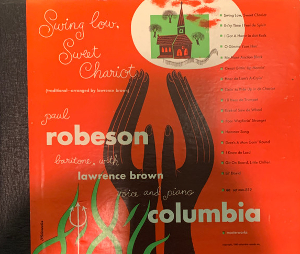
Swing Low, Sweet Chariot is a studio album by Paul Robeson, released in 1949 on Columbia Masterworks. Robeson was accompanied on piano by Lawrence Brown, who also provided additional vocals on some of the tracks.
The following is the discography of American singer Paul Robeson.












